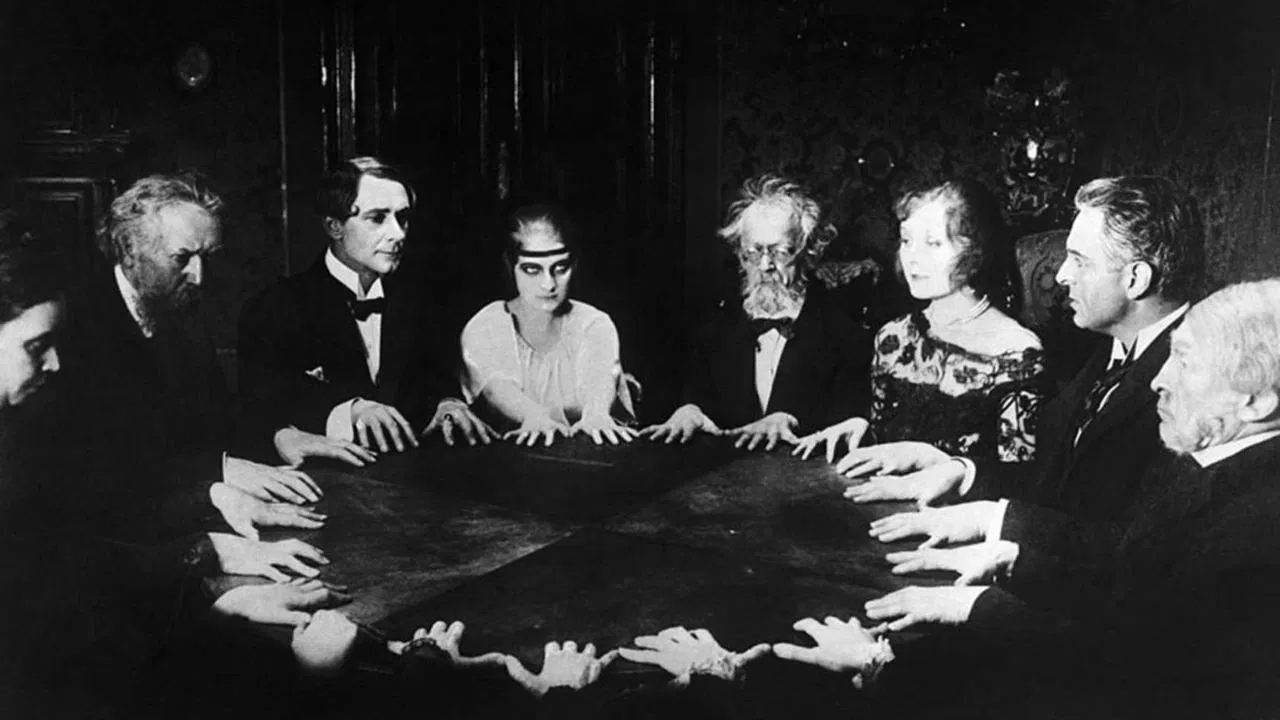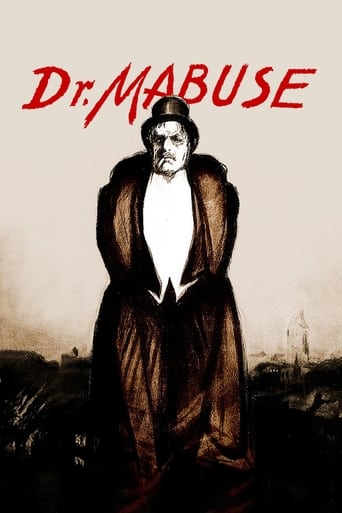

Dr. Mabuse is probably the ultimate villain - he's charismatic, intelligent, and renown professor, but he also, manipulates with people, gambles, keeping salves, counterfeiting money, organizes murders and kidnappings, and he is just pure evil. He only doesn't chase the power and money, but he is simply evil. That all makes Dr. Mabuse the most evil man of the 1920's, and sets him as an example of great villain.Under ascetic conditions of German film studios at the time Fritz Lang managed to direct his first masterpiece (out of many) and one of his most influential films. Mixing styles and elements from different genres Lang creates chilling underworld that just sucks the viewer in (at least here writer felt he would like to visit all those shady night clubs). And of course, the final gunfight that many later directors have copied on countless times.
... View MoreArch-criminal Dr. Mabuse sets out to make a fortune and run Berlin. Detective Wenk sets out to stop him.Easily what could be called an epic, coming in at around four and a half hours... this silent era film puts even Peter Jackson to shame. Fritz Lang is obviously one of the giants of cinema, both German and American, silent and with sound. This is one of his that deserves to be seen by all even if it tests our patience a bit (free up an afternoon or two).Some could debate that Lang was the greatest director in German silent cinema, and I think that is a position that could be defended. His obvious opponent is Murnau, but Lang has the advantage of longevity.
... View MoreIt is interesting to discover or rediscover Fritz Lang. He was well known for one film, Metropolis, and then for a few American films, films he shot in the USA. But the full set of Dr Mabuse's films is fascinating in a way because it provides a rare vision on the German cinema from the early 1920s to 1960. The eye looking at the world from a German point of view that spans over Hitler, Nazism and the Second World War is Fritz Lang's. We know him for his highly symbolical Metropolis in which the meaning is built by visual and numerical symbols. In this Dr Mabuse it is different. There are quite a lot of symbols but inherited from the silent cinema of the old days, symbols that are there only to make clear a situation that had been depicted previously with pictures and no words, or a page of intertitles. Fritz Lang still uses that technique in his 1960 film, which is a long time overdue for a silent cinema technique. But that is a style, nothing but a way of speaking, not a meaning. The meaning is absolutely bizarre. Dr Mabuse is a highly criminal person but his objective is not to commit crimes in order to get richer or whatever. It is to control the world through his criminal activity. The world is seen as basically negative, leading to chaos and overexploitation, leading to anarchistic crime and nothing else because the only objective of this modern world is to make a profit by all means available. Dr Mabuse is a master mind of his time and for him crime is the only way to destroy that capitalistic world that he never calls capitalistic or Kapitalismus and to replace it with pure chaos that should be able to bring a regeneration, a rejuvenating epiphany, a re-founding experience. We find in his mind what we could find in some of the most important criminal minds in this world, like Carlos in France, or Charles Manson in the USA, or those sects that practice mass suicide in order to liberate the suicidees and to warn the world about the coming apocalypse. It is the mind and thinking of those who practice war as a revolutionary activity with a fundamentalist vision of their religions or politics and the world that is supposed to reflect that religion. They do not want to build a different society and when they are in power they are constantly aiming at antagonizing their own population and the world because they cannot exist if they do not feel some opposition that they can negate, bring down, crush, like in Iran, or in Germany with Hitler, though later on it was not much different under the Communists in East Germany. These visions need opposition to exist and they provoke that opposition by aiming at taking the control of the world with violence and imposing their control with more violence. That's Dr Mabuse, the main brain of a criminal decomposition and re-composition of society on an absolutely antagonistic vision of life. But that vision is very common. Just as common as this phrase "a half full glass is nothing but a half empty glass". Add antagonism to that dual vision and then you have a struggle to the death between the half empty glass that wants to be full and the half full glass that wants to be empty (or full?), one half only wanting to take what the other half has and impose his half to the other half to make the world one by the elimination of the other side of the coin. That dual antagonistic vision is the popular and shrivelled up approach of the communist catechism of Stalin, inherited from Marx's French son in law Paul Lafargue, or of course in all dictatorship that reduces life to a little red book, to one hundred quotations from the master thinker of the revolution. That's the world you feel in these films. Fritz Lang embodies this ideology of the mentally poor in that criminal character of his: kill, rob, steal, counterfeit. Even if you die when doing so, the world will change and remember. The master criminal has to die in his activity in order to regenerate the world. What Fritz Lang introduced in his double main feature of the early 1920s and in his Testament, is that the master brain of this vision internalizes this paranoid and psychotic vision of the world into himself and has to become psychotic himself and it is in his psychosis that he finds the energy to conquer the world again. In the third film, Dr Mabuse has been dead for a long time and is reincarnated by someone who finds his inspiration in the doctor. That is a far-fetched cinematographic and fictional antic that is necessary as a reference but brings nothing to the vision itself. A few years later that ideology was to conquer our imagination in many ways. First the Berlin Wall became the symbol of that vision the way it was carried and conveyed to the world by the East-German communists. Then we have to think of the various revolutionary movements like Der Baader Meinhof Komplex, Die Rote Armee Fraktion, to take some German examples. But think of the French Mesrine and the Italian revolutionary urban guerrilla warfare movements and you will have a fair picture of this psychotic criminal mind copied and pasted into the political field. The Maoist Red Guard and Cultural Revolution movement was quite typical of this approach. All that was going to come in 1960 and we must admit Fritz Lang was seeing ahead of his time, just as he had seen Hitler in his Testament of Dr Mabuse: a political leader based on hypnosis and mesmerizing people into blindly following a band of criminals.Dr Jacques COULARDEAU, University Paris 1 Pantheon Sorbonne, University Paris 8 Saint Denis, University Paris 12 Créteil, CEGID
... View MoreDr. Mabuse is a name familiar to almost everyone in Germany, but most Americans would have to be told that he's a criminal mastermind, psychiatrist, gambler and hypnotist with supernatural powers. Mabuse is notable for his brilliant disguises and his gang of minions who conspire against people and institutions for the sole purpose of bringing power and wealth to himself. This evil genius is known only as The Great Unknown to those who wish to stop him. Mabuse was created by Norbert Jacques for a novel which has never been out of print in Germany. The director of this film, Fritz Lang, claimed him for his own; and now Mabuse is known not as a character in a novel but as a character in three Fritz Lang films, the first of which is this innovative and hugely influential silent movie.Lang's storytelling techniques are especially innovative, but later spy films, including Lang's own, have greatly improved on what's here and leave modern viewers alert to the slow pace, murky details and confusing plot twists. What hasn't been improved upon is the artistry behind the photographic effects. I don't mean the effects themselves: modern special effects are infinitely more sophisticated. This film's effects have a great impact even—or especially—on today's viewer who is accustomed to a rapid-fire series of elaborate, gaudy computer-generated pictures, like those in, say, Peter Jackson's "King Kong." Nothing in that film is as memorable to me as this movie's scene where the camera closes in on Mabuse and everything around him goes dark, leaving only one glowing, malevolent head floating in the blackness.The highly exaggerated style of acting from everyone in the cast would look idiotic if seen in isolated bits. Von Welk (Bernhard Goetzke), tilting back his head and crossing his eyes as Mabuse (Rudolf Klein-Rogge) hypnotizes him, would have been a perfect clip for Jay Ward's "Fractured Flickers." As part of this film, every melodramatic moment from the cast is effective in a way that a more naturalistic style can never be.Fans of the Mabuse films, which number many more than just Lang's three, are sometimes disappointed by this first incarnation. This Mabuse allows himself violent emotional outbursts, while the later version is marked by icy self-control. The more familiar Mabuse may be an improvement over this one, but they don't quite replace him, and those films don't quite replace this one. This is a treasure for film historians, and indirectly a treasure for fans of the countless movies influenced by it.For those who simply want a good movie, there's plenty here to reward them, provided they are very, very patient.
... View More